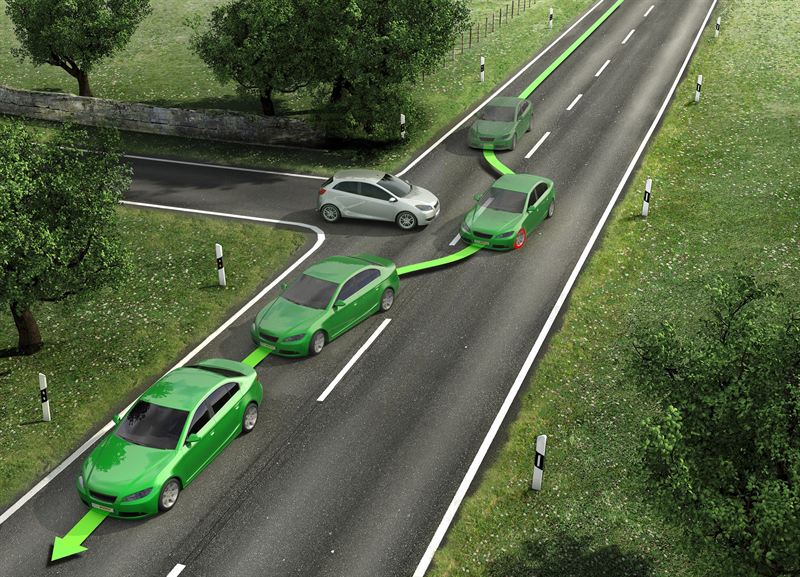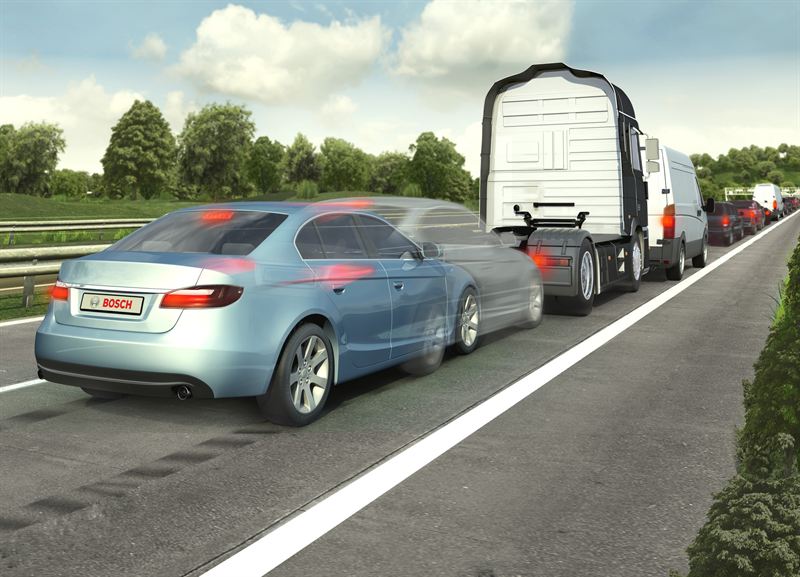“Stop the Crash”: Bosch partners Global NCAP initiative
- Vehicle safety and driver assistance systems are still underused, especially in emerging markets
- "Stop the Crash" aims to boost awareness of technology such as Electronic Stability Program (ESP) and Automated Emergency Braking (AEB)
- Bosch safety systems prevent accidents and reduce the effects

Bosch has announced its support of the Global New Car Assessment Programme’s (Global NCAP) “Stop the Crash” initiative, which aims to boost awareness of vehicle safety systems such as ESP, emergency braking systems and motorcycle ABS. More than 3,000 people worldwide lose their lives in traffic accidents every day, according to Global NCAP. Especially in emerging markets, these fatalities are often the result of vehicles that are inadequately equipped and provide poor protection for passengers and pedestrians.
The effectiveness of the different technologies will be featured in driving demonstrations at the initiative’s launch event in Brasilia from 17-19 November. “Stop the Crash” also supports the United Nations in its aim to halve the number of traffic fatalities worldwide − currently 1.25 million per year − by 2020.
“For Bosch, every traffic fatality is one too many. With our technologies, we can protect human life around the world,” says Dr. Dirk Hoheisel, member of the Bosch board of management.

ESP has prevented 190,000 accidents in Europe since 1995
Bosch has been working for many years on the vision of accident and injury-free driving. It has already achieved considerable success: since Bosch launched the ESP electronic stability programme in 1995, it has prevented 190,000 accidents and saved more than 6,000 lives across Europe.
If all vehicles were equipped with the anti-skid system, up to 80 percent of all skidding accidents could be prevented. Bosch has manufactured more than 150 million ESP systems since 1995.
“After the seat belt, ESP is the most important vehicle safety system − even more important than the airbag,” Hoheisel says.
Nine out of ten new vehicles across Europe are already equipped with ESP
Since 1 November 2014, ESP has been mandatory within the European Union for all newly registered cars and light commercial vehicles weighing up to 3.5 tonnes. Across Europe, 90 percent of all cars and light commercial vehicles are therefore already equipped with ESP, compared to only 64 percent worldwide.
Global NCAP is calling upon UN member states, especially those with a significant vehicle manufacturing industry, to mandate ESP for all new vehicles by 2020. The World Health Organisation (WHO) is also calling for legal regulations to mandate ESP. A large number of human lives around the world could be saved as a result. Outside the EU, the anti-skid system is now also mandated in Australia, Canada, Israel, New Zealand, Russia, South Korea, Japan, Turkey, and the United States.

Bosch emergency braking systems protect vulnerable road users
ESP is also the basic technology for many driver assistance systems, which intervene to support drivers in potentially dangerous situations − such as changing lanes, or taking evasive action and braking when encountering an obstacle. Rear-end collisions are among the worst − especially if pedestrians or cyclists are involved. Automatic emergency braking systems can prevent such collisions entirely; or, at the very least, considerably mitigate their impact.
If a radar or video sensor detects a potential obstacle ahead of the car, the braking system is prepared to make a full emergency stop and the driver is warned. If the driver fails to respond, the system begins to slow the car. As soon as the driver engages the brakes, the system increases braking power to prevent the accident. If the driver also fails to respond to the slowing of the car and the system detects that a collision is unavoidable, it autonomously performs an emergency stop. At speeds of up to 25mph in urban traffic, the Bosch emergency braking system can completely prevent collisions with stationary vehicles.
38 percent fewer rear-end collisions
According to EuroNCAP, AEB technology has already reduced the number of rear-end collisions by 38% since its introduction. The system is most effective at low speeds (up to 25mph) where three quarters of accidents take place. It is believed that AEB can reduce the occurrence of these collisions by 20%. Thatcham research claims that if all cars were fitted with AEB today, it would result in 17,000 fewer deaths and serious injuries by 2025.
Motorcycle ABS: one-quarter fewer accidents involving casualties
As early as the mid-1990s, Bosch developed an antilock braking system for the safety of motorcyclists. Many countries now have legislation mandating this safety system. Like in a car, ABS also prevents a motorcycle’s wheels from locking up during emergency braking meaning that motorcyclists can brake without fear, and with greater force. The motorcycle remains stable and the rider is prevented from falling.
Bosch has suitable solutions for every type of motorcycle. In addition to the optimisation of size and weight, it has focused on reducing costs, so as to make ABS technology available for all vehicle classes and markets. This also includes the price-sensitive vehicles with up to 250cc displacement which are popular in emerging markets.
“ABS can prevent one-quarter of all motorcycle accidents involving casualties,” Hoheisel says.
Press photos: 1-CC-21783, 1-CC-20682, 1-CC-20685, 1-CC-21172,
1-CC-21085, 1-CC-19647
Related links:
http://bit.ly/1PDSwwO
https://youtu.be/ZsS73_d-qUM
www.stopthecrash.org
www.globalncap.org
Contact person for press inquiries:
Rianne Ojeh, 01895 838 822
Email: Rianne.Ojeh@uk.bosch.com
The Bosch Group is a leading global supplier of technology and services. It employs roughly 360,000 associates worldwide (as per April 1, 2015). The company generated sales of 49 billion euros in 2014.* Its operations are divided into four business sectors: Mobility Solutions, Industrial Technology, Consumer Goods, and Energy and Building Technology. The Bosch Group comprises Robert Bosch GmbH and its roughly 440 subsidiary and regional companies in some 60 countries. Including its sales and service partners, Bosch is represented in roughly 150 countries. This worldwide development, manufacturing, and sales network is the foundation for further growth. In 2014, Bosch applied for some 4,600 patents worldwide. The Bosch Group’s strategic objective is to create solutions for a connected life. Bosch improves quality of life worldwide with products and services that are innovative and spark enthusiasm. In short, Bosch creates technology that is “Invented for life.”
The company was set up in Stuttgart in 1886 by Robert Bosch (1861-1942) as “Workshop for Precision Mechanics and Electrical Engineering.” The special ownership structure of Robert Bosch GmbH guarantees the entrepreneurial freedom of the Bosch Group, making it possible for the company to plan over the long term and to undertake significant up-front investments in the safeguarding of its future. Ninety-two percent of the share capital of Robert Bosch GmbH is held by Robert Bosch Stiftung GmbH, a charitable foundation. The majority of voting rights are held by Robert Bosch Industrietreuhand KG, an industrial trust. The entrepreneurial ownership functions are carried out by the trust. The remaining shares are held by the Bosch family and by Robert Bosch GmbH.
Additional information is available online at www.bosch.com, www.bosch-press.com, http://twitter.com/BoschPresse.
*The sales figure disclosed for 2014 does not include the former joint ventures BSH Bosch und Siemens Hausgeräte GmbH (now BSH Hausgeräte GmbH) and ZF Lenksysteme GmbH (now Robert Bosch Automotive Steering GmbH), which have since been taken over completely.







